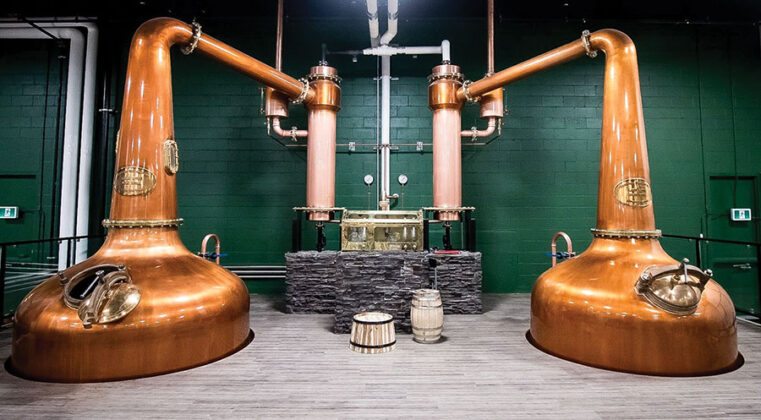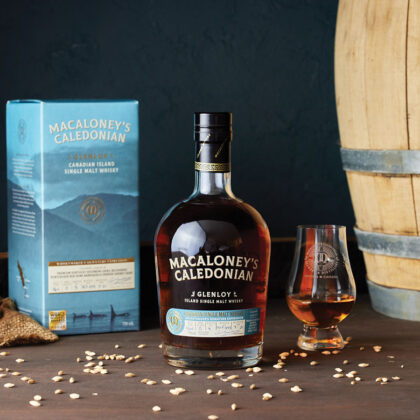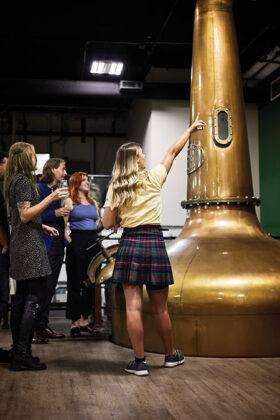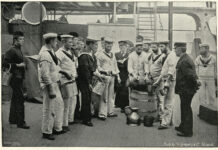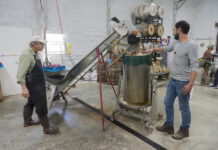Graeme Macaloney opened his Victoria Caledonia brewery and distillery on Vancouver Island, British Columbia, in 2016. His idea? Make an extraordinary Scotch-style whisky that reflected the Pacific Northwest. He hired Jim Swan, the late, legendary Scotch consultant, and imported traditional pot stills from Forsyths in Scotland, building his distillery just outside the city of Victoria.
While he produced and aged his own distillate, he imported casks of whisky from Scotland, which he blended and sold as “blended malt Scotch whisky.” To ensure he wasn’t running afoul of the Scotch Whisky Association (SWA) guidelines, he ran the label by them and asked if they had any objections. None were raised.
A few years later, he finally started selling his own aged distillate made with British Columbia grain, marketing it as Macaloney’s Caledonian Whisky. He then released Glenloy and Invermalie expressions, named as nods to Macaloney’s Scottish heritage. (“My family has lived in Glenloy for thousands of years,” he says, “so I’d think I’d be able to use that name.”)
But that’s when the trouble began. “Next thing we knew, a lawsuit was filed against us,” he says.
The SWA was claiming he was intending to confuse the consumer, to make them think he was selling Scotch when it was technically Canadian whisky. They objected to Macaloney using his Scottish surname and to the terms “Caledonia,” “Glenloy,” and “Invermalie.” They even disputed the word “island,” suggesting it was evocative of Scotland — never mind that Macaloney lived and worked on an island and his cartons featured prominent maps of Vancouver Island.
Macaloney decided to fight back.
He was hardly the first to find himself crosswise with the Scotch Whisky Association. They’ve long been fiercely protective of their geographical indicator status, recognizing that consumers associate Scotland with a certain style and quality of whiskey and concerned that that reputation could be put at risk if others elsewhere sought to ride on their coattails. And when it came to the term “Scotch whisky,” they had the power of international agreements behind them. It’s registered as a geographical indicator with the European Union, and this in turn is recognized via international agreements and local legislation with many other nations — including the United States and Canada.
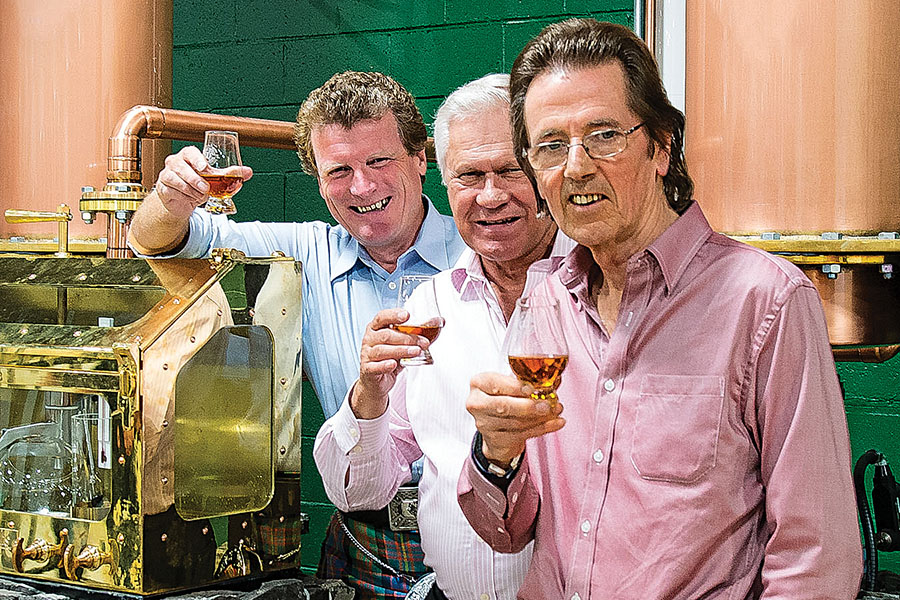
According to U.S. federal law, “Scotch whisky” is defined as “a distinctive product of Scotland manufactured in Scotland in compliance with the laws of the United Kingdom.” The SWA strengthened its claim in the United States in June 2022 when “Scotch whisky” received trademark status, giving them another tool to pursue counterfeiters and distillers who sought to mislead consumers.
“The courts, and most people, they know what a trademark is,” says Lindesay Low, deputy director of legal affairs at the SWA in Edinburgh. “It’s a more streamlined way of enforcing our rights. We think that’s going to make things easier.”
It’s obvious why the SWA would vigorously pursue anyone who uses the phrase “Scotch whisky” in their marketing. But less clear are the criteria it follows when opting to pursue labels that hint at, rather than baldly claim, Scottish provenance.
The trademark, granted on June 1, notes that “the mark certifies or is intended to certify that the goods/services provided originate in Scotland and have met the Standards as set forth in The Scotch Whisky Regulations 2009. And Regulation 6 within that makes it illegal to label, package, sell, or advertise a whiskey “in such a way as to suggest indirectly that the drink is Scotch Whisky, when it does not qualify as such.”
Well before it was granted U.S. trademark status, the SWA challenged distilleries based on a broad interpretation of the phrase “suggest indirectly.” For instance, it objected to Virginia Distilling Co.’s use of the word “Highland” on its label. The two settled in 2019 when the distillery agreed to drop the offending term from their marketing.
In India, where the SWA once estimated that as much fake Scotch is sold as authentic Scotch, they won a ruling in 2016 against Golden Bottling, which was selling a “Red Scot” whiskey. In Germany earlier this year, the SWA won on appeal their case against Waldhorn Distillery, prohibiting them from using their Glen Buchenbach brand on the grounds that “glen” suggested Scottish provenance.
The term “glen” was also the source of a long-running dispute in Canada, after the SWA sought to force Glenora Distillery on Cape Breton Island in Nova Scotia, the nation’s first single malt distillery, to abandon its Glen Breton branding. The suit bounced around the courts for years, and not until 2009 did the Supreme Court of Canada side with the distiller, securing the right to keep its name. (The distiller celebrated by swiftly releasing an expression called “Battle of the Glen.”)
A decade later, on Canada’s Pacific Coast, Macaloney learned from Glenora’s long battle. The Glenora suit went through four levels of judicial appeal over nine years. This showed that the SWA had deep pockets and could be relentless in pursuit of individual distillers until they capitulated or went bankrupt.
Macaloney’s attorney warned him that defending himself against the SWA’s lawsuit could take $500,000 to $1 million, an expense he could ill afford. “An $8 billon industry is not to be messed with,” Macaloney says.
Instead, he embarked on a public relations campaign. “The biggest recourse was court of public opinion,” he says. “That was a democratization, if you will, of the situation.” He sent out press releases and open letters to other distillers, painting the SWA as a predatory organization seeking to deprive him of his patrimony and business.
He pointed out to anyone who would listen that he was merely using his own surname, and that New Caledonia was the original name for a portion of British Columbia. The press picked up the story. “‘Big Scotch’ is going after this Canadian distiller for naming his whisky after himself,” read a 2021 headline in Maclean’s, a popular Canadian magazine.
As for the word “glen,” Macaloney notes that the word came to Scotland from Ireland, and he idly wonders what gives the Scots the right to claim exclusivity. (According to the United States Geological Survey database, there are also 2,028 places in the United States that contain the word “Glen,” from The Glen in New Hampshire to Glen Ellen in California, with many names bestowed by immigrants from Ireland and Scotland centuries ago.)
Macaloney reserves special disdain for the SWA’s objection to the word “island” in his marketing. In his open letter to craft distillers, he wrote that it was “truly upsetting” that the SWA claimed “island” is a term evocative of Scotland, which he cited as a “clear case of overreach.”
For its part, the SWA says there isn’t a list of banned words that it pursues — rather, it weighs the overall impression that a label and marketing seeks to convey. “‘Island’ is a really good example of how, if you pick one element, it just appears ridiculous,” admits the SWA’s Low. “But it’s got a Scottish place name on it. It’s got a Scottish surname on it. And then you add island single malt, which is a term used in the Scotch whisky industry. We’re looking at the overall impression.”
That same reasoning was their cited objection to “glen” on Macaloney’s label, a term that Canadian courts permitted in the case of Glen Breton. The SWA argues that when it becomes part of a constellation of terms to convey an impression of Scotland, it should lose its protected status.
On chat rooms and online forums, distillers have also raised the perception of inconsistency and favoritism in the SWA’s global enforcement of claims. It’s often noted that the SWA hasn’t pursued Bagpiper whisky in India — a brand owned by Diageo, which has three seats on the SWA’s council, including that of the chairman.
The SWA admits that enforcement isn’t uniform around the globe. “When you protect Scotch across the world, there will inevitably be inconsistencies due to different legal systems,” Low says. The SWA says it targeted Bagpiper whisky years ago, long before Diageo acquired it, but opted not to pursue the case in the courts as the brand had been long established and India didn’t sign on to international geographic indication agreements until 2015.
“But what I can say about Bagpiper is the gentleman on the label is now a Sikh, whereas previously he was an Anglo sort of British Army officer,” Low adds. “So that changed, and we live with the name in India, although not in any other country in the world.”
Low says that the best way for craft distillers to sidestep potential legal hassles is to approach the SWA in advance, before deciding on a label. He notes that they’re happy to do this informally and in confidence. (The email is legal@swa.org.uk.)
“I know we’ve got a reputation as being aggressive litigators,” Low says. “But the truth is, most of the issues that we face are resolved quietly behind the scenes. We’re always willing to talk to people, and we would far rather identify a problem early on and look for a solution than have to litigate later.”
“At the end of the day, what we want to avoid is [consumers] being confused,” Low insists. “We want to avoid distinctive symbols associated with Scotland being eroded.”
Last April, Macaloney settled the civil suit brought by the SWA. He agreed to drop the term “Caledonia” from both the label and the distillery name. He’s also giving up the names Glenloy and Invermalie as expressions. He feels the resolution was fair, but he also believes that taking his case to the public helped him in working out an agreement.
Macoloney hopes that the SWA considers updating its existing labeling guidelines. “Amend those with a view to giving guidance to the burgeoning craft industry,” he says. “It’s going to minimize the amount of conflict.”
A Leprechaun Whiskey?
Last June, Colin Spoelman, the co-founder and distiller at Kings County Distillery in Brooklyn received a cease-and-desist letter from a lawyer representing the Irish Whiskey Association. The organization objected to the distillery’s limited-run sale of an “Irish-Style whiskey” released to celebrate St. Patrick’s Day.
Spoelman fired back with a letter a few days later. He noted that the release sold out and was unavailable, so the letter was moot. But he added, “we will not promise to cease or desist from selling this product in the future, as we must respectfully disagree that this product creates confusion or attempts to mislead consumers into thinking they are buying Irish whiskey.”
He went on to note that the label was careful to state that this was a Brooklyn-distilled whiskey made in the Irish tradition and that he wasn’t interested in piggybacking on the image of Irish whiskey. His goal was to educate an increasingly sophisticated whiskey community about the many different styles around the world.
“I feel like these organizations are responding to an era from 30 years ago, in terms of how alcohol is made, marketed, and sold, when it was entirely built on branding and naming and image-making. Whereas now, everything is about storytelling,” he says.
“I don’t want to pick a fight. I just want to be able to say we’re making an Irish-style whiskey that communicates to the consumer the tradition of Irish distilling — without winking, without having to turn myself into a pretzel to communicate this.”
Spoelman hopes for clarity so Kings County can move forward and produce another limited release next St. Patrick’s Day that celebrates the style without having to resort to a cute and legally evasive name, like “Leprechaun-style” whiskey.
Spoelman has been in touch with the lawyer representing the IWA and found her to be “perfectly reasonable.”
“There’s a peace treaty that wants to be signed,” he says.

